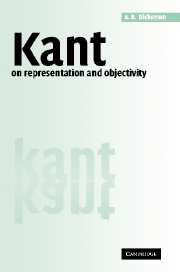Introduction
Published online by Cambridge University Press: 22 September 2009
Summary
This book is a study of the argument that lies at the heart of Kant's epistemology: the argument of the ‘Transcendental Deduction of the Pure Concepts of the Understanding’. It focuses on the version of that argument given in the second edition of the Critique of Pure Reason (i.e., the so-called ‘B-Deduction’). The main interpretations of this argument that are to be found in the secondary literature read it as hinging on notions such as personal identity, the ‘ownership’ of mental states, or the ontological unity of the mind. I, on the other hand, will argue that in the B-Deduction Kant is crucially concerned with the problem of how the ‘objective reality’ or content of a representation – and, in particular, of a complex representation – becomes accessible to the subject that has the representation. In other words, he is concerned with the representationalist parallel of the semantic question of what it is to understand a complex sign.
In summary, my interpretation of Kant's argument in the B-Deduction is as follows. In order for the subject to have a unified grasp of a complex representation – or, as Kant puts it, for the ‘unity of apperception’ to be possible – an act of ‘spontaneous synthesis’ is required. This is an act of the mind that plays a role in generating the representational content of the subject's experience.
- Type
- Chapter
- Information
- Kant on Representation and Objectivity , pp. 1 - 3Publisher: Cambridge University PressPrint publication year: 2003



